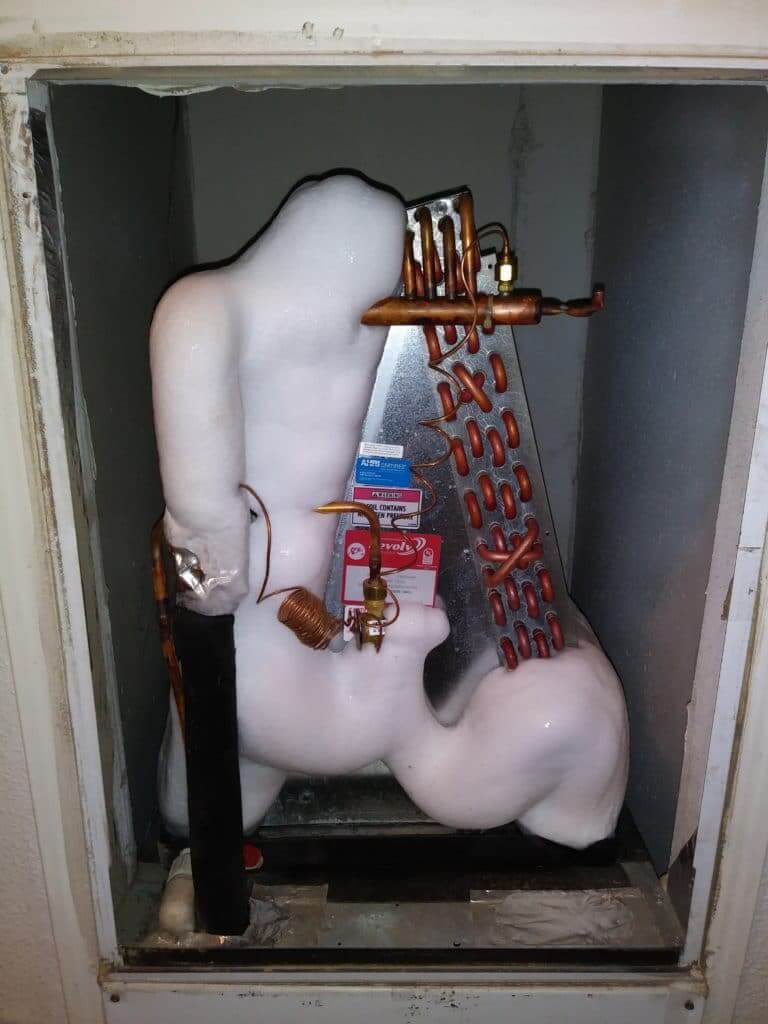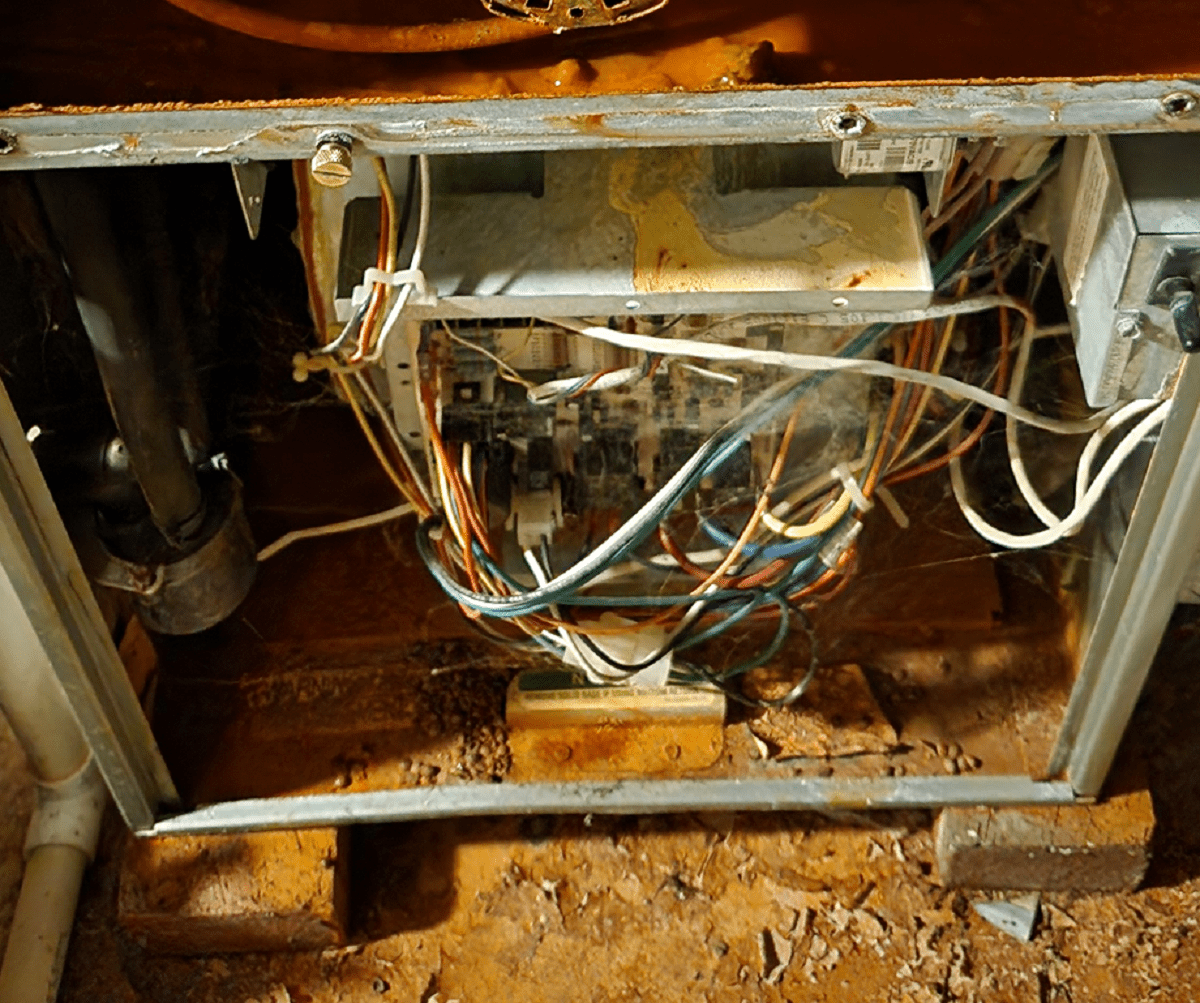Over time, dust gets past your air filter and into your ac coil. As condensation drips down your ac coil into the condensation drain pan some of those same impurities flow down the condensate drain and into the trap where they set and turn to a drain plugging sludge. Some of this same sludge collects right at drain connection to the pan.
Not enough slope or additional traps created by piping being incorrectly installed will cause other areas to plug and backup your drain. Wherever moisture is collecting, which is mostly in the drain pan, the place where mold and algae is creating the sludge that has been plugging your drain.
Removing the sludge in the drain will probably get you by for the season but you’ve got to fix the problem to stop all that debris from coming down the duct into the coil to go down the drain and plugging it again. Looking up the air stream toward the filter will give you some indication of where that dust is coming from.
A thorough duct and coil cleaning and filter upgrade will keep that condensate drain clean for much longer. Cleaning the coil with a vacuum rarely works as the debris is usually buried into the coil and not just on the surface. Sometimes a semi stiff brush can help.
Chemicals are the best way to get the job done. There are some wonderful products that can be easily sprayed on the coil and also aid in cleaning the drain lines. Amazon has these if that’s your preference for shopping. Take a look there and get some ideas for what will work.
This foam cleaner is self rinsing and has a lemon order. Why the dust is getting to the coil needs to be addressed. To keep future dust from getting past your filter and plugging your drain make sure your filter is the proper type and size. Also that it fits snugly on all four sides not letting any air short circuit past it.
Where Is My AC Drain Line And Coil Pan
Hopefully you can find easy access to the condensation drain pan and remove the algae and moldy stuff that has piled up against the origin of the drain line. If you’re having a problem locating the drain, look for the white 3/4 inch PVC pipe attached to your furnace. The coil will very likely be right behind the panels directly above the drain.
How To Unclog An AC Drain Pipe
Here’s a few tips on how to clean an air conditioner condensation drain line
Sometimes a wet dry vac with a skinny tip on the hose will allow you to suck up a lot of what’s plugging the drain. Having done that and your drain is still plugged you can find several drain cleaning tools available online. Amazon has a slug of choices from suckers to blowers or even brushes to shove down the pipe. Take a look (ad)
You may even like the idea of an ac drain line cleaner or ac drain line tablets.If none of these are down your alley or you’ve already tried some to no avail and you continue to have a constant issue with your ac drain plugging, it’s time to start over.
Vinegar vs Bleach For Cleaning An AC Drain
You can choose. But bleach stinks, it’s vapors can be harmful and it never fails to get on something it shouldn’t. A half portion of bleach and water down the drain in the cooling season would probably do no harm.
Leaving the bleach in the drain trap in the heating season when it won’t get flushed out by a running ac could be a might caustic for the pipe. Bleach will attack the PVC and the glue in the joints allowing the line to leak or fall apart.
Vinegar does the same job without any harmful results. For the best cleaning use regular distilled white vinegar.
Can You Snake An AC Drain Line?
Even if you do find or already have a snake just the right size and flexibility to run down a 3/4 PVC pipe wouldn’t it be easier and more effective to get a half dozen 3/4 couplings, some PVC glue and cut the drain line.
Take it outside and hose it out. Bring it back in and maybe snake some parts of the line that you didn’t want to remove and then reassemble the pipe. Always double check the slope.
Install A New AC Drain Line
Just cut the old one off and install some new clean PVC. This time do it right and provide a clean-out just above your trap so you can easily treat and/or flush that trap on a yearly basis. If you can’t find a preformed trap then check out this clear and easy to see through trap on Amazon (ad).
Traps are an essential part of a condensate drain. Without a trap you can actually block the flow of condensation from leaving the pan especially when the indoor fan or blower runs. Negative air pressure created around the area of the evaporator coil will pull air up through the drain pipe into the pan and the pan will fill with water and overflow.
Not all systems will do that, but if you had no trap and condensation is leaking around your coil and furnace area that could be the problem. Make sure you use the proper ac drain pipe size. 3/4 inch PVC pipe and fittings. Reducing the size is asking for the same problem to occur later on.
Proper PVC Gluing. Do I Need A Primer?
Some will say you need a primer. I seldom use it. The reason why is that condensate drains are under no pressure. It’s simply a low pressure drain. I prefer just using a clear PVC glue like this one I found for you on Amazon. Sometimes I get the wet/dry type because you never know if the pipes will be dry or not when your trying to stick the darn things together.
I even leave some joints with no glue depending on stress and location of the pipe. It helps in cleaning the drains. Especially if it’s a male end looking down into a coupling or a 90 degree fitting.
You’ll have to decide if that’s how you want to assemble your PVC. Remember it’s not under pressure. The likelihood of it leaking is slim if your joints are clean and tightly pushed together.
If your PVC job is over a finished room use a lot of caution and maybe then you will want to use a primer.
Why Is My AC Drain Pipe Making Noise
It goes back to having no trap or a trap that is empty. Negative air pressure in the return side of a furnace will pull air from the exit point of the drain line.
With just a small amount of condensation in the drain pan it will gurgle like crazy against the drain until enough condensate is created in the pan.
When the fan shuts off the condensate will flow down the drain and fill the trap. Hopefully.
Why Does My Air Conditioner Have Condensation?
Condensation is the moisture in the air related to humidity. Some areas of the country such as the deep southeastern United States have more humidity than some northwestern high desert areas.
Air conditioning systems in sections of the world that have high humidity can produce several gallons of condensation per day while high desert or dryer climates can be less that a gallon. So if you were to ask how much condensation from a home ac is normal the answer would be “it depends on where you live”
What If My Home AC Has No Condensation?
No condensation is pretty rare unless you live in a desert. I live in what they call the high desert of eastern Oregon. In the early summer our home creates about a gallon of condensate in a day and as the summer goes on and becomes dryer it’s quite a bit less.
On the other side of the Cascade mountains it’s a different story. When we lived in the Portland/Vancouver area it wasn’t unusual to see 5 gallons in a day.
If you live in an area that has low humidity or a season of the year where humidity is near nothing then it may be hard to tell without a service call from a qualified technician. On the other hand if humidity is high and no water is coming out of your ac drain then you may have a problem.

Some of the things that go wrong and can cause a lack of condensation are:
- No or limited air flow from a defective motor or capacitor
- A dirty indoor AC coil restricting air flow
- Dirty filters
- Closed registers
- Low refrigerant (Freon) charge
There’s more buy you get the point.


